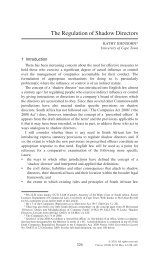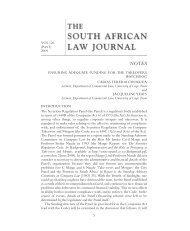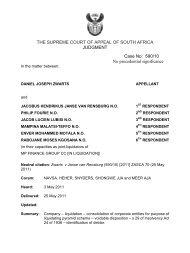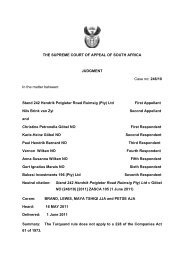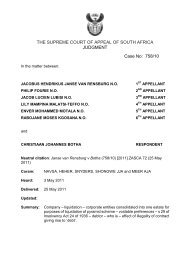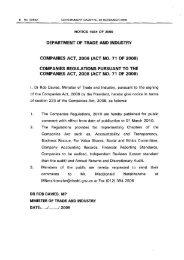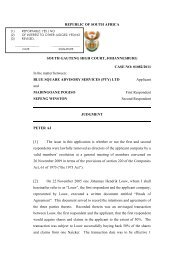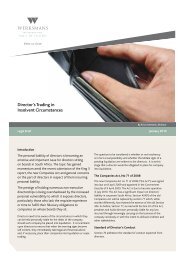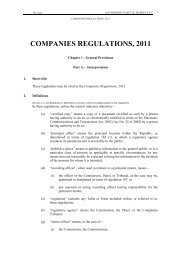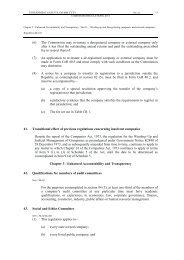Pre-incorporation contracts - Company Law Hub
Pre-incorporation contracts - Company Law Hub
Pre-incorporation contracts - Company Law Hub
You also want an ePaper? Increase the reach of your titles
YUMPU automatically turns print PDFs into web optimized ePapers that Google loves.
PRE-INCORPORATION CONTRACTS: STATUTORY REFORM*<br />
CAROLINE B NCUBE<br />
Lecturer, University of Cape Town<br />
INTRODUCTION<br />
South African company law is undergoing a major two-stage overhaul that<br />
will culminate in the coming into force of the Companies Act 71 of 2008.<br />
The first stage was completed with the coming into force of the Corporate<br />
<strong>Law</strong>s Amendment Act 24 of 2006 on 14 December 2007 (Proc 47 GG 30594<br />
of 14 December 2007) and the second stage will be completed with the<br />
coming into force of the Companies Act, 2008. This Act has been assented to<br />
by the <strong>Pre</strong>sident and was published for information on 9 April 2009 (GN 421<br />
GG 32121 of 9 April 2009). Section 225 of this Act provides that it will come<br />
into force on a dated fixed by the <strong>Pre</strong>sident by proclamation in the Gazette,<br />
which may not be earlier than one year following the date of presidential<br />
assent. The earliest that the Act can come into force is therefore 9 April 2010.<br />
This note examines certain aspects of the regulation of pre-<strong>incorporation</strong><br />
<strong>contracts</strong> contained in s 21 of the Companies Act, 2008, read with the<br />
definition of the term ‘pre-<strong>incorporation</strong> contract’ contained in s 1. The<br />
policy considerations underlying the current provision regulating this issue<br />
(s 35 of the Companies Act 61 of 1973) and some of the difficulties of<br />
interpretation that section has presented will be considered, with a view to<br />
evaluating whether there is any policy shift evident in s 21, and whether its<br />
provisions represent an improvement on its predecessor. The formulation of<br />
s 21 draws on the provisions of its counterpart in the recently amended New<br />
Zealand Companies Act, 1993, and so consideration will also be given to<br />
those provisions.<br />
This note finds that although the imported provisions relating to<br />
pre-<strong>incorporation</strong> <strong>contracts</strong> are based on a more balanced and nuanced<br />
* I am indebted to Professor Richard Jooste, the late Professor Michael Larkin<br />
and Graham Bradfield for their invaluable comments on earlier drafts of this note.<br />
The usual disclaimer applies.
256<br />
THE SOUTH AFRICAN LAW JOURNAL<br />
policy, our importation of these provisions is less than ideal, as it duplicates<br />
problematic provisions which ought to have been avoided. The note<br />
therefore concludes that the proposed reforms relating to pre-<strong>incorporation</strong><br />
<strong>contracts</strong> are in principle commendable, but suffer from some defects which<br />
should have been rectified before enactment.<br />
This note does not purport to be a comprehensive analysis of pre<strong>incorporation</strong><br />
<strong>contracts</strong>. Rather, it seeks to offer insights on some aspects of<br />
s 21. As a result, several issues fall beyond the scope of this note. Such issues<br />
include an analysis of its provision for shareholder protection, and an<br />
examination of how, if at all, s 21 protects unsophisticated promoters and<br />
regulates the interim period between conclusion of the pre-<strong>incorporation</strong><br />
contract and the <strong>incorporation</strong> of the company.<br />
SECTION 35 OF THE COMPANIES ACT<br />
<strong>Pre</strong>-<strong>incorporation</strong> <strong>contracts</strong> are currently regulated by s 35 of the Companies<br />
Act, which was recently amended by s 8 of the Corporate <strong>Law</strong>s<br />
Amendment Act. Section 35 now reads:<br />
‘Any contract made in writing by a person professing to act as agent or trustee<br />
for a company not yet incorporated shall be capable of being ratified or adopted<br />
by or otherwise made binding upon and enforceable by such company after it<br />
has been duly incorporated as if it had been duly incorporated at the time when<br />
the contract was made and such contract had been made without its authority:<br />
Provided that the memorandum on its registration contains as an object of such<br />
company the ratification or adoption of or the acquisition of rights and<br />
obligations in respect of such contract, and that such contract, has been lodged<br />
with the Registrar together with the lodgement for registration of the<br />
memorandum and articles of the company.’<br />
This section creates a form of statutory agency by providing for the<br />
ratification by a company after its <strong>incorporation</strong> of a contract concluded on<br />
its behalf by a person professing to be its agent or trustee before its<br />
<strong>incorporation</strong>. (See H S Cilliers, M L Benade, J J Henning,JJduPlessis, P A<br />
Delport, L de Koker, J T <strong>Pre</strong>torius Cilliers & Benade Corporate <strong>Law</strong> 3ed<br />
(2000) para 5.04 (hereafter Cilliers & Benade); M S Blackman, R D Jooste, G<br />
K Everingham, M Larkin, C H Rademeyer, J L Yeats Commentary on the<br />
Companies Act vol 1 (Revision Service 2007) 4-4–4-13 (hereafter Commentary);<br />
Tshepo Mongalo Corporate <strong>Law</strong> & Corporate Governance: A Global Picture<br />
of Business Undertakings in South Africa (2003) 104–8). At common law this<br />
would not be possible: one cannot act as an agent for a non-existent principal<br />
nor can the principal, once it comes into existence, ratify such acts<br />
retrospectively (Kelner v Baxter [1866] LR 2 CP 174 incorporated into South<br />
African law by McCullogh v Fernwood Estate Ltd 1920 AD 204; Cilliers &<br />
Benade paras 5.02–5.03; Commentary 4-6 and 4-10-1; Wilfred M Estey<br />
‘<strong>Pre</strong>-<strong>incorporation</strong> <strong>contracts</strong>: the fog is finally lifting’ 2000 Canadian Business<br />
LJ 3at7;Kantey & Templer (Pty) Ltd v Van Zyl NO 2007 (1) SA 610 (C) para<br />
38). A pre-<strong>incorporation</strong> contract can be effectively ratified under s 35<br />
provided the stipulated requirements are met. First, the promoter must
NOTES 257<br />
expressly disclose that he is contracting on behalf of a prospective company,<br />
as ‘trustee’ or ‘agent’. Secondly, the pre-<strong>incorporation</strong> contract must be<br />
reduced to writing. Thirdly, the memorandum of the company upon<br />
registration must list the ratification of that contract as one of its objects.<br />
Fourthly, the contract must be lodged with the Registrar of Companies<br />
together with the memorandum and articles of association when the<br />
application for the <strong>incorporation</strong> of the company is made. (Prior to 14<br />
December 2007, two copies of the pre-<strong>incorporation</strong> contract, one of them<br />
notarized, were required — see s 8 of the Corporate <strong>Law</strong>s Amendment Act,<br />
2006). Finally, ratification under s 35 by a company with a share capital is<br />
possible only after the company becomes entitled to commence business<br />
(Commentary 4-10-1; Cilliers & Benade paras 5.06–5.11).<br />
The interpretation of this section has proved to be problematic in certain<br />
respects. For example, it is debatable whether a ratified pre-<strong>incorporation</strong><br />
contract comes into force retrospectively from the date of its conclusion<br />
(Richard Jooste ‘When do pre-<strong>incorporation</strong> <strong>contracts</strong> have retrospective<br />
effect?’ (1989) 106 SALJ 507 at 50; Commentary 4-10-1). Peak Lode Gold<br />
Mining Co Ltd v Union Government 1932 TPD 48 at 51–2 held that<br />
pre-<strong>incorporation</strong> <strong>contracts</strong> ratified under s 71, the predecessor to s 35,<br />
could not have retrospective effect. On the other hand, the current general<br />
consensus of academics is that ratified pre-<strong>incorporation</strong> <strong>contracts</strong> have<br />
retrospective effect unless the parties agree otherwise (Cilliers & Benade para<br />
5.19; Commentary 4-10–4-11; Mongalo op cit at 108; Maleka Femida Cassim<br />
‘<strong>Pre</strong>-<strong>incorporation</strong> <strong>contracts</strong>: reform of section 35 of the Companies Act’<br />
(2007) 124 SALJ 364 at 387–9; Jooste op cit; Jennifer A Kunst, Piet Delport<br />
& Quintus Vorster (eds) Henochsberg on the Companies Act 5 ed vol 1 (Issue 24)<br />
63–4 (hereafter Henochsberg)). As stated above, the purpose of s 35 is to<br />
overcome the general difficulty of agency at common law, one aspect of<br />
which relates to ratification (Jooste op cit at 508; Cassim op cit at 364).<br />
Therefore, if s 35 is complied with, pre-<strong>incorporation</strong> <strong>contracts</strong> ought to<br />
have retrospective effect unless the parties agree otherwise. This makes<br />
ratification in terms of s 35 consistent with ratification at common law. To<br />
argue otherwise would result in inconsistency between s 35 and ratification<br />
at common law (Cilliers & Benade para 5.19; H R Hahlo South African<br />
<strong>Company</strong> <strong>Law</strong> through the Cases 6ed (1999) 106).<br />
POLICY CONSIDERATIONS<br />
Before discussing the proposed reforms it is instructive to consider the<br />
current policy considerations underpinning s 35. This will provide the<br />
backdrop to my assessment as to whether a policy shift is necessary, and if so,<br />
what modifications to s 35 are appropriate under the new company law<br />
dispensation.<br />
It appears that the main aim of s 35 is the protection of the promoter<br />
(Cassim op cit at 368; Henochsberg 62) by providing a mechanism to avoid<br />
personal liability on a pre-<strong>incorporation</strong> contract. However, such protection
258<br />
THE SOUTH AFRICAN LAW JOURNAL<br />
is at the expense of the third party ‘who bears the full risk of non-ratification’<br />
(Cassim op cit at 368). Section 35 leaves third parties particularly vulnerable<br />
because it does not provide for any obligation of a promoter prior to<br />
ratification or upon non-ratification due to non-<strong>incorporation</strong> of the<br />
prospective company, or a post-<strong>incorporation</strong> refusal to ratify the contract by<br />
the company (Henochsberg loc cit). In the present socio-economic context of<br />
post-apartheid South Africa, both government policy and practice encourage<br />
and facilitate increased entrepreneurial activity by historically disadvantaged<br />
and often unsophisticated people. Consequently, to expose third parties to<br />
the risks of s 35 is inequitable (Cassim op cit at 368–9).<br />
The counter-argument to the position just presented would be that<br />
although s 35 does not provide for the liability of promoters, it does offer<br />
some protection for third parties, as it requires a promoter to disclose or<br />
‘profess’ that he represents an unincorporated company. Such disclosure is in<br />
effect a warning to third parties — one which should accordingly place them<br />
on their guard. It alerts them to the need to negotiate with promoters and<br />
thereby secure accountability or liability of the promoter should the<br />
pre-<strong>incorporation</strong> contract fail. The obvious retort to this argument is that<br />
such a warning does not assist an unsophisticated third party who would not<br />
know how, and perhaps even why, he should ensure the inclusion of a<br />
promoter’s liability clause in a pre-<strong>incorporation</strong> contract (see Cassim op cit<br />
378 on the third party’s lack of appreciation of the complexities of<br />
pre-<strong>incorporation</strong> <strong>contracts</strong>).<br />
Clearly, a policy shift is necessary to achieve a more balanced treatment of<br />
potentially predatory promoters and third parties — possibly unsophisticated<br />
entrepreneurs — who enter into pre-<strong>incorporation</strong> <strong>contracts</strong>. Third parties<br />
can be placed in a better starting position by way of clearly stipulated<br />
protection, out of which the parties could then contract if they agreed to do<br />
so. This would ensure that vulnerable third parties are not left to their own<br />
devices in determining the scope and content of the protection for which<br />
they must ask in contracting with promoters. Promoters, who are usually<br />
better-equipped, ought rather to bear such responsibility (Cassim op cit at<br />
368). In striving to achieve a balance in this manner, care must be taken with<br />
the regulation of exemption clauses in pre-<strong>incorporation</strong> <strong>contracts</strong>, because<br />
such clauses take away the protection the law has extended to third parties.<br />
Two conflicting policy concerns emerge here, namely freedom of contract<br />
and the protection of third parties (Natasha M Johnson <strong>Pre</strong>-<strong>incorporation</strong><br />
Contracts in <strong>Company</strong> <strong>Law</strong>: A Comparative Study (unpublished LLM thesis,<br />
University of the Western Cape, 2000) 183). Promoting freedom of contract<br />
exclusively would mean that it would be left entirely up to the parties to<br />
exclude a promoter’s liability and to enforce all such clauses in all<br />
circumstances. But unsophisticated third parties are unlikely to appreciate<br />
the full import of exemption clauses; therefore the position needs to be<br />
mitigated by factoring in the protection of third parties.<br />
An appropriate way to do this would be to balance freedom of contract<br />
and protection of third parties by enforcing only those exemption clauses
NOTES 259<br />
that are simply and clearly worded (Cassim op cit at 378). This would be in<br />
accordance with the treatment of exemption clauses generally at common<br />
law, which employs strict and narrow construction (Francois du Bois (ed)<br />
Willie’s Principles of South African <strong>Law</strong> 9 ed (2007) 811–14; Robert Sharrock<br />
Business Transactions <strong>Law</strong> 7 ed (2002) 209, citing First National Bank of SA Ltd<br />
v Rosenblum and Another 2001 (4) SA 189 (SCA) and Barnard v Protea Assurance<br />
Co Ltd t/a Protea Assurance 1998 (3) SA 1063 (C); see also Durban’s Water<br />
Wonderland (Pty) Ltd v Botha 1999 (1) SA 982 (SCA) at 989 H–I and Drifters<br />
Adventure Tours CC v Hircock 2007 (2) SA 83 (SCA) para 10). This policy is<br />
informed by the need to protect vulnerable third parties from contracting<br />
parties who seek to limit their usual liability at law. The law is wary of such<br />
exclusions of liability because they may be abused to the detriment of third<br />
parties. In view of the already precarious position of third parties entering<br />
into pre-<strong>incorporation</strong> <strong>contracts</strong>, they perhaps deserve more protection than<br />
the general common law approach to exemption clauses. Indeed, some<br />
commentators have argued for the creation of standard exemption forms or<br />
clauses that are clearly and simply worded to ensure meaningful third party<br />
protection (Cassim op cit at 378).<br />
THE REFORM OF SECTION 35<br />
Section 1 of the Companies Act, 2008 begins the reform of s 35 with the<br />
following definition of a ‘pre-<strong>incorporation</strong> contract’:<br />
‘[A]n agreement entered into before the <strong>incorporation</strong> of a company by a<br />
person who purports to act in the name of, or on behalf of, the company, with<br />
the intention or understanding that the company will be incorporated, and will<br />
thereafter be bound by the agreement.’<br />
This definition is extremely important because it clearly indicates that the<br />
Act only applies when a promoter purports to act as an agent, not as a<br />
principal, when concluding a pre-<strong>incorporation</strong> contract. Currently, it is not<br />
indisputably clear that s 35 applies to agency situations alone, because it also<br />
refers to ‘professed’ trustees who generally act as principals (Cilliers & Benade<br />
para 5.08; Sentrale Kunsmis Korporasie Bpk (Edms) v NKP Kunsmisverspreiders<br />
(Edms) Bpk 1970 (3) SA 367 (A) at 398B). The implication is that where a<br />
promoter purports to act as a principal, the position will be regulated by the<br />
common law rules of stipulatio alteri. The promoter’s agency status will be<br />
discussed further in a subsequent part of this note.<br />
Formalities<br />
Section 21’s first and most striking departure from s 35 is the omission of the<br />
formal requirements relating to lodgement of the pre-<strong>incorporation</strong> contract<br />
with the Registrar and listing its ratification as one of the company’s objects<br />
in the memorandum of <strong>incorporation</strong> (memorandum). The requirement<br />
that pre-<strong>incorporation</strong> <strong>contracts</strong> be reduced to writing is retained. The<br />
possible reasons for the retention of this requirement and the omission of the<br />
lodgement and objects clause requirements are discussed in turn below.
260<br />
THE SOUTH AFRICAN LAW JOURNAL<br />
Written pre-<strong>incorporation</strong> <strong>contracts</strong><br />
Section 35 requires, for certainty’s sake, that a pre-<strong>incorporation</strong> contract<br />
must be reduced to writing before it may be susceptible to ratification. A<br />
written contract is an important component of a company’s records, and<br />
ensures full and accurate disclosure within the company, for example from<br />
promoter to the directors (A J Easson & D A Soberman ‘<strong>Pre</strong>-<strong>incorporation</strong><br />
<strong>contracts</strong>: common law confusion and statutory complexity’ (1992) 17<br />
Queen’s LJ 414 at 447; Estey op cit at 12 note 34). Section 21 retains this<br />
requirement through subsec 1, which reads (my emphasis):<br />
‘A person may enter into a written agreement in the name of, or purport to act in<br />
the name of, or on behalf of, an entity that is contemplated to be incorporated<br />
in terms of this Act, but does not exist at the time.’<br />
The retention of this requirement is commendable because it is dictated<br />
by the need for certainty and full disclosure.<br />
Stipulation in the objects clause requirement<br />
In so far as it relates to the capacity of a company, the proposed removal of<br />
the s 35 requirement that the ratification of pre-<strong>incorporation</strong> <strong>contracts</strong> be<br />
listed as an object in the objects clause of a company’s memorandum is<br />
understandable. Currently, a company has limited capacity and can only<br />
validly do what its memorandum’s objects clause permits it to. Section<br />
19(1)(b) of the Companies Act, 2008 proposes to change this by giving<br />
companies the capacity of a natural person as far as it is possible for a juristic<br />
person. A company’s memorandum will therefore not need to state a main<br />
object (Cassim op cit at 394). As a result, there should be no need to list the<br />
ratification of a particular pre-<strong>incorporation</strong> contract as a specific object of a<br />
company.<br />
However, to the extent that there were any other reasons for the<br />
enactment of this requirement, perhaps there is a need to retain it, albeit not<br />
as an object but simply as a disclosure requirement. Disclosing the ratification<br />
of a pre-<strong>incorporation</strong> contract in the company’s memorandum and the<br />
lodgement of the relevant pre-<strong>incorporation</strong> contract serve as an important<br />
protection of outsiders who may wish to extend credit to or invest in the<br />
company (Cassim op cit at 394). Potential creditors or investors intending to<br />
transact with a particular company can determine its pre-<strong>incorporation</strong><br />
commercial activities from that company’s memorandum. This enables them<br />
to make informed decisions about whether to transact with or invest in that<br />
company. But the corollary of such potential creditor/investor protection is<br />
that such disclosure requirements are prejudicial to companies, as will be<br />
apparent from the discussion below (Cilliers & Benade 63; Cassim op cit at<br />
394).<br />
The pertinent question therefore is whether the protection that this<br />
requirement purports to offer outweighs the potential prejudice to companies.<br />
In selecting to remove this requirement, Parliament has decided that the<br />
potential prejudice to companies outweighs outsider protection. This
NOTES 261<br />
decision is justifiable because outsider protection can be achieved by other<br />
means. For example, the financial status of some companies may be<br />
ascertained through the perusal of their audited annual financial statements<br />
filed at the Registrar of Companies’ offices upon payment of the prescribed<br />
fees. In other instances, assurances of a company’s liquidity and solvency or<br />
an overview of its commercial undertakings can be requested directly from<br />
that company. If false or inaccurate information is given by a company in<br />
order to induce a third party to enter into a contract, that third party will also<br />
have ordinary contractual remedies upon discovery of the misrepresentation.<br />
Lodging copies of pre-<strong>incorporation</strong> <strong>contracts</strong><br />
The removal of the lodgement formality by the Companies Act, 2008 raises<br />
an interesting related point. Section 8 of the Corporate <strong>Law</strong>s Amendment<br />
Act, 2006 amended s 35 to remove the formal requirement of the lodgement<br />
of two copies, one notarized, of pre-<strong>incorporation</strong> <strong>contracts</strong>. Companies<br />
now only have to lodge ‘the contract’. This seems to be a reference to the<br />
original pre-<strong>incorporation</strong> contract because, prior to its amendment, s 35<br />
expressly required copies of the pre-<strong>incorporation</strong> contract. It may be that<br />
one uncertified copy of the relevant pre-<strong>incorporation</strong> contract would<br />
suffice, but if that is the case the provision should have said so expressly. It is<br />
not clear why this amendment was deemed necessary, as ultimately s 21<br />
removes the lodgement requirement altogether. Modifying a requirement<br />
that will soon be abolished is confusing: affected persons are required to<br />
adapt to new laws which are, in any event, due to be abandoned within three<br />
years of their introduction.<br />
The Corporate <strong>Law</strong>s Amendment Act was intended to deal with urgent<br />
matters that could not be delayed until the enactment and coming into force<br />
of the new Companies Act. Consequently, the only justification for so<br />
modifying the lodgment requirement prior to its ultimate removal by the<br />
new Companies Act would be that it is currently highly prejudicial or<br />
onerous. This is certainly not the case here, because it is not very onerous to<br />
secure certification of a contract by a notary public. Further, promoters can<br />
resort to other common law methods of securing pre-<strong>incorporation</strong><br />
<strong>contracts</strong> if they consider this requirement onerous.<br />
The removal of the lodgement requirement<br />
The ultimate removal of the lodgement requirement contemplated by the<br />
Companies Act, 2008, is a welcome and overdue development because it is<br />
inequitable to companies and their co-contracting parties alike (Cilliers &<br />
Benade para 5.22). Lodging copies of pre-<strong>incorporation</strong> <strong>contracts</strong> robbed<br />
companies and their contractual partners of confidentiality, and possibly<br />
exposed them to unfair practices such as undercutting by competitors<br />
(Cassim op cit at 394). Admittedly, the removal of the lodgement<br />
requirement prioritizes the protection of companies, and the third parties<br />
with whom they enter into pre-<strong>incorporation</strong> <strong>contracts</strong>, over the protection<br />
of potential creditors/investors. However, there is no other way to obviate
262<br />
THE SOUTH AFRICAN LAW JOURNAL<br />
the potential prejudice to companies and their contractual partners. By<br />
contrast, as previously stated, there are other ways of acquiring information<br />
for, and protecting potential creditors/investors. In addition, one must<br />
remember that promoters are also subject to fiduciary duties (Cassim loc cit).<br />
Disclosure of promoter’s agency status<br />
Section 35 currently provides for the ratification of a pre-<strong>incorporation</strong><br />
contract concluded by a person ‘professing to act as agent or trustee’ of an<br />
unincorporated company. This phrase is not used in s 21. Before assessing the<br />
new formulation in relation to the capacity in which the promoter professes<br />
to act in s 21, it is instructive to comment on the s 35 formulation. To<br />
‘profess’ literally means ‘to declare openly; announce or affirm; avow or<br />
acknowledge’ (Dictionary.com Unabridged (v 1.1) available at http://<br />
dictionary.reference.com/browse/profess, last accessed on 3 June 2009). However,<br />
in the context of s 35 its definition as part of the composite phrase ‘professing<br />
to act as an agent or trustee’ has been problematic. This is due to the<br />
confusion relating to what is meant by the phrase ‘professing to act as a<br />
trustee’. In Sentrale Kunsmis (supra) at 397 Trollip JA stated that it ‘connotes<br />
that, whilst the person declares that he is acting as a trustee, he is in fact or in<br />
law not one’. In other words, Trollip JA was saying that the section applies<br />
only in those circumstances where the promoter is not in fact acting as a<br />
trustee but merely ‘professing’ to act as such. Ultimately, then, the promoter<br />
would in reality be acting as agent. This interpretation has been criticized,<br />
and it has been suggested instead that the section also applies to situations<br />
where the promoter is in fact a trustee. This would mean that the section is<br />
applicable to promoters acting either as agent or trustee/principal (J D Swart<br />
‘<strong>Pre</strong>-<strong>incorporation</strong> <strong>contracts</strong>’ 1977 SACLJ F-36 at F-42; Cilliers & Benade<br />
para 5.08 relying, inter alia, on McCullugh v Fernwood Estate Ltd (supra) at<br />
207; Cassim op cit at 367 and 395; and see also Johnson op cit 24–36). It also<br />
has been pointed out that the word ‘professing’ is an inadequate translation of<br />
the Afrikaans word ‘verklaar’ used in the authentic text and that ‘declares’ is a<br />
more accurate translation (Swart loc cit).<br />
In view of such debates, it is prudent for the Companies Act, 2008 to<br />
attempt to reach a conclusive resolution by reformulating s 35. Section 21(1)<br />
of the Companies Act, 2008 provides (my emphasis):<br />
‘A person may enter into a written agreement in the name of, or purport to act in<br />
the name of, or on behalf of, an entity that is contemplated to be incorporated<br />
in terms of this Act, but does not yet exist at the time.’<br />
Instead of the phrase ‘professing to act as agent or trustee’, s 21 refers to a<br />
person who ‘purports to act in the name of or on behalf of, a company’. It is<br />
noteworthy that instead of using the recommended or suggested words<br />
‘declares’ or ‘states’, s 21 uses the term ‘purport[s]’. Determining its meaning<br />
is essential to an assessment of whether it is an adequate substitution for both<br />
‘professing’ and ‘declares’. When used as a verb, as it is in this case, ‘purport’<br />
means to ‘represent intentionally either expressly or by implication, a certain
NOTES 263<br />
state of affairs or status’ (my emphasis) (Dictionary.com Unabridged (v 1.1),<br />
available at http://dictionary.reference.com/browse/purport, last accessed on 3<br />
June 2009). On the other hand, to ‘declare’ is to make an express statement.<br />
‘Purport’ therefore has a wider meaning than ‘declare’ in that it also refers an<br />
implied representation. One may argue that practically speaking, broadening<br />
the ambit of s 21 in this manner does not add much value given the difficulty<br />
of proving an implied representation by a promoter. However, the mere fact<br />
that an implied representation may be difficult to prove does not mean that it<br />
is impossible. Moreover, proof of an implied representation is ultimately a<br />
question of fact that is dependant on the circumstances of the particular case.<br />
It would therefore be imprudent, on the ground of mere difficulty, to<br />
exclude what could potentially be a useful avenue of redress for a third party.<br />
Therefore it seems that ‘purports’ is an appropriate word to use instead of<br />
‘declares’, as it extends the section to situations where a promoter implies<br />
that he is acting on behalf of, or in the name of, a future company and thus<br />
provides remedies for a class of third parties for whom the law had previously<br />
not catered. It also eliminates the debate about the meaning of ‘profess’.<br />
As previously noted, a reading of s 21 with the s 1 definition of a<br />
pre-<strong>incorporation</strong> contract leads one to the conclusion that s 21 applies only<br />
in those cases where a promoter has disclosed or implied that he or she is the<br />
agent of an unincorporated company. This is because s 1 provides that a<br />
pre-<strong>incorporation</strong> contract is concluded in the name of, or on behalf of, an<br />
unincorporated company. Section 21 reinforces this by also providing that<br />
the promoter must purport to contract in the name of, or on behalf of, such a<br />
company. A trustee does not act ‘in the name of, or on behalf of’ another;<br />
rather, a trustee <strong>contracts</strong> as principal in his own name. Although s 21 applies<br />
only to promoters acting as agent, where a promoter acts as principal it will<br />
still be possible for the company to adopt the relevant pre-<strong>incorporation</strong><br />
contract under the common law rules relating to stipulatio alteri (McCullogh<br />
(supra) at 207; Swart op cit at F-42; Johnson op cit at 32).<br />
The exclusion of principals from s 21 is in stark contrast to the position<br />
under s 35. As shown above, s 35 can also be interpreted to apply to<br />
promoters acting as principals. This coverage of trustees or principals is<br />
beneficial to the extent that it provides an additional means of ratification.<br />
The company set to benefit from the pre-<strong>incorporation</strong> contract is afforded<br />
an additional avenue of ratification by s 35. It can choose to ratify under the<br />
common law or under s 35.<br />
However, s 35 does not regulate the liability of the promoter in any way.<br />
The liability of the promoter acting as trustee or principal is thus determined<br />
in accordance with the contract between the third party and the principal<br />
(Henochsberg 63). The main criticism levelled against s 35 is its failure to<br />
provide for promoter liability, which leaves third parties vulnerable. The<br />
main advantage s 21 has over s 35 is its provision for promoter liability,<br />
which is discussed further below. However, s 21 does not apply to promoters<br />
acting as principals. This is unfortunate because third parties concluding<br />
pre-<strong>incorporation</strong> <strong>contracts</strong> with promoters acting as principals do not have
264<br />
THE SOUTH AFRICAN LAW JOURNAL<br />
the same protection as is extended to those who contract with promoters<br />
who act as agents. There does not seem to be a convincing reason for this<br />
distinction. In order to provide uniform third party protection, s 21 should<br />
have included promoters acting as principals.<br />
Repudiation<br />
Section 21(4) grants companies a three-month period after <strong>incorporation</strong><br />
within which to ‘completely, partially or conditionally ratify or reject any<br />
pre-<strong>incorporation</strong> contract’ entered into on their behalf. Section 21(4) has<br />
thus retained the s 35 provision for ‘a positive step of ratification’ (a phrase<br />
used by Cassim op cit at 383) by providing that a company must ratify a<br />
pre-<strong>incorporation</strong> contract it wishes to perform. Two issues immediately<br />
stand out as noteworthy in the consideration of this section. The first is the<br />
significance of the provision for a three-month period during which a<br />
company is to decide whether or not to ratify a pre-<strong>incorporation</strong> contract.<br />
Section 35 does not have a similar provision. Generally, companies should<br />
ratify pre-<strong>incorporation</strong> <strong>contracts</strong> within the contractually agreed time or, in<br />
the absence of such an agreement, within a reasonable time. However, the<br />
determination of a reasonable time is ultimately made by courts and is<br />
dependent on the facts of each matter. Consequently, those third parties who<br />
are party to pre-<strong>incorporation</strong> <strong>contracts</strong> that do not stipulate a time period<br />
for ratification may find their affairs being held in limbo for lengthy periods<br />
of time whilst they wait for a company to decide whether or not to ratify the<br />
pre-<strong>incorporation</strong> contract in issue. In addition, they may have to resort to<br />
litigation to compel a company to make the decision, which ultimately may<br />
not be made in their favour. Section 21’s modification of the current position<br />
by its provision for a specified period within which companies are to decide<br />
whether to ratify pre-<strong>incorporation</strong> <strong>contracts</strong> is in the interests of third<br />
parties and companies. It accords companies a fair amount of time within<br />
which to order their affairs post <strong>incorporation</strong> and to consider their<br />
pre-<strong>incorporation</strong> <strong>contracts</strong>. At the same time, third parties will benefit from<br />
this provision because they will have to wait a maximum of three months for<br />
a company’s decision in this regard.<br />
The second issue is that, like s 35, s 21(4), whilst providing for positive<br />
ratification (or rejection), does not provide for the manner of ratification or<br />
rejection. It is therefore entirely up to a company to determine the manner<br />
of ratification or rejection. In the interests of certainty, it may have been<br />
prudent to provide for a manner of ratification in the same way as do s 53(2)<br />
of the South African Close Corporations Act 69 of 1984 and ss 180 and<br />
182(4) of the New Zealand Companies Act.<br />
The Close Corporations Act provides that ratification ‘shall be in the form<br />
of a consent in writing of all the members of the corporation, given within a<br />
time specified in the contract or, if no time is specified, within a reasonable<br />
time after <strong>incorporation</strong>’ (s 53(2)). The New Zealand Companies Act<br />
provides that ratification be similarly effected in writing by the directors<br />
(ss 180 and 182(4)). Such express provision for the manner of ratification is
NOTES 265<br />
desirable because it increases the level of certainty for all parties involved.<br />
Although neither the Close Corporations Act nor the New Zealand<br />
Companies Act provide for a manner of rejection, it is submitted likewise<br />
that for the sake of completeness the manner of rejection also ought to have<br />
been stipulated in the Companies Act, 2008.<br />
Importantly, s 21(5) provides that if a company fails to ratify or reject a<br />
pre-<strong>incorporation</strong> contract within the three-month period, it will be<br />
‘regarded to have ratified that agreement’. This section complements s 21(4).<br />
As already stated, s 21(4) grants companies three months within which to<br />
decide whether to ratify or reject a pre-<strong>incorporation</strong> contract and to take<br />
appropriate action. Section 21(5) then provides for the consequences of a<br />
company’s failure to act within this three-month period by providing for<br />
deemed ratification after the expiry of that period. Currently, both in terms<br />
of s 35 and the common law, there is no deemed ratification of pre<strong>incorporation</strong><br />
<strong>contracts</strong>. Section 21(5) is thus novel. A number of comments<br />
can be made about the significance of this section.<br />
At first sight, s 21(5) appears almost punitive in nature — companies that<br />
fail to decide on pre-<strong>incorporation</strong> <strong>contracts</strong> within the stipulated time do so<br />
on the penalty of being bound by those <strong>contracts</strong>. However, any apparent<br />
harshness is mitigated by the three-month grace period which companies are<br />
afforded by s 21(4). Secondly, s 21(5) provides necessary protection for third<br />
parties, as it holds lax companies to pre-<strong>incorporation</strong> <strong>contracts</strong>. It forces<br />
companies to apply their minds to pre-<strong>incorporation</strong> <strong>contracts</strong> and take<br />
appropriate action within three months. Thirdly, the section provides some<br />
relief for promoters in its imposition of secondary liability on companies.<br />
This is because the promoter is freed from liability once the company is<br />
deemed to have ratified the pre-<strong>incorporation</strong> contract, and the company<br />
thus becomes liable to the third party. Such a transfer of liability from the<br />
promoter to the company is particularly helpful where the failure to make a<br />
decision timeously is not attributable to any fault of the promoter. To<br />
continue to hold the promoter liable in such circumstances would be unfair<br />
to promoters. Sections 21(4) and (5) have equitably balanced the interests of<br />
third parties, companies and promoters, and as such they constitute a marked<br />
improvement on s 35.<br />
Retrospective effect of ratified pre-<strong>incorporation</strong> <strong>contracts</strong><br />
As already mentioned, whether s 35 provides for the retrospective effect of<br />
pre-<strong>incorporation</strong> <strong>contracts</strong> is debatable. The Companies Act, 2008 therefore<br />
attempts to clarify this matter once and for all by means of s 21(6)(a)<br />
which provides (my emphasis):<br />
‘To the extent that a pre-<strong>incorporation</strong> contract or action has been ratified or<br />
regarded to have been ratified in terms of subsection (5) the agreement is as<br />
enforceable against the company as if the company had been a party to the agreement<br />
when it was made.’<br />
The wording of this provision follows the popular formulation employed<br />
by the legislation in a number of other jurisdictions (see Cassim op cit at
266<br />
THE SOUTH AFRICAN LAW JOURNAL<br />
388). For example, it is quite similar to s 182(3) of the New Zealand<br />
Companies Act, which provides ‘[a] contract that is ratified is as valid and<br />
enforceable as if the company had been a party to the contract when it was<br />
made’. Unfortunately, this formulation has not proved to be problematic<br />
because it does not indisputably provide for retrospective effect (Cassim loc<br />
cit). Scholars have debated the import of such formulations, with some<br />
arguing that it meant ratified pre-<strong>incorporation</strong> <strong>contracts</strong> were retrospective<br />
to the date of their conclusion, and others arguing that they are retrospective<br />
to the date of the company’s <strong>incorporation</strong>. Any reform should therefore use<br />
clear and unambiguous wording to resolve such debates conclusively. I<br />
suggest that the section should read ‘pre-<strong>incorporation</strong> <strong>contracts</strong> have<br />
retrospective effect and are binding from the date of their conclusion’. Such<br />
wording would clearly remove any potential for confusion. It would also<br />
ensure that ratification under s 21 corresponds with ratification at common<br />
law as outlined above.<br />
Remedies: promoter and company liability<br />
If the entity on whose behalf a pre-<strong>incorporation</strong> contract was concluded is<br />
not incorporated, or, if it is incorporated, it repudiates the pre-<strong>incorporation</strong><br />
contract, the third party can seek relief against the promoter in terms of<br />
s 21(2). In addition, it seems that s 21(2) extends liability for the failure of a<br />
pre-<strong>incorporation</strong> contract to persons in addition to, or instead of, a<br />
promoter. It provides (my emphasis):<br />
‘A person who does anything contemplated in subsection (1) is jointly and<br />
severally liable with any other such person for all liabilities created as provided for<br />
in the pre-<strong>incorporation</strong> contract while so acting, if —<br />
(a) the contemplated entity is not subsequently incorporated; or<br />
(b) after being incorporated, the company rejects any part of such an<br />
agreement or action.’<br />
The first half of the section is a clear reference to promoters acting as<br />
company agents. It is not clear to whom the phrase ‘any other such persons’<br />
in the second half of the section refers. The use of the word ‘such’ suggests<br />
that the identificatory criteria applicable to promoters are also applicable to<br />
these other persons. If they are, then ‘any other such person[s]’ are simply<br />
promoters acting as company agents who, if not legally appointed as such, are<br />
de facto occupying such positions. As already stated in the previous section<br />
on the promoter’s agency status, s 21 in its entirety is applicable only to those<br />
situations where promoters act as agents. This is the clear import of the s 1<br />
definition of pre-<strong>incorporation</strong> <strong>contracts</strong>, when read with s 21(1).<br />
The reasons for the inclusion of the reference to ‘any other such person’ in<br />
s 21(2) are unclear. It may have been included to cater for circumstances<br />
where there are two or more promoters, but the pre-<strong>incorporation</strong> contract<br />
in issue is signed by only one of them. Without this subsection, only the<br />
promoter who executed the contract would be liable. The subsection may<br />
also have been intended to deal with the situation in which there is more<br />
than one promoter, and to provide that instead of such persons being jointly
NOTES 267<br />
liable so that a third party would have to sue each one for their pro rata share<br />
of the liabilities, one of them could be sued as being jointly and severally<br />
liable for the entire amount of those liabilities, leaving that promoter to<br />
recover pro rata shares from the others involved. As already stated, s 21 does<br />
not apply to a promoter acting as trustee. Hence, such promoters could not<br />
be included in this category of ‘any such persons’. As discussed above, this<br />
position is inequitable, since third parties contracting with promoters who as<br />
agents are protected by s 21, whilst those who contract with promoters<br />
acting as principals or trustees are denied the same protection.<br />
Section 21(3) and (6)(b) provides that promoters will be released from<br />
liability where novation or (actual or deemed) ratification occur, respectively.<br />
The significance of this provision is that, in addition to novation or<br />
actual ratification, a promoter will also be released from liability when the<br />
company is deemed to have ratified the pre-<strong>incorporation</strong> contract in issue.<br />
These provisions achieve fair treatment of promoters by releasing them from<br />
liability on the three grounds stated above. Of these three grounds, deemed<br />
ratification is novel. I have commented on it in the part of this note entitled<br />
‘Repudiation’ above. I will also revisit it in a subsequent section entitled<br />
‘Third party protection’ below.<br />
Section 21(7) then provides that a promoter who bears liability after a<br />
company rejects a pre-<strong>incorporation</strong> contract may lay a claim against the<br />
company concerned for any benefit it has received or is entitled to receive<br />
under the pre-<strong>incorporation</strong> contract. This section provides protection for a<br />
promoter who finds himself accountable to a third party in circumstances<br />
where the company has received some benefit under a repudiated<br />
pre-<strong>incorporation</strong> contract. The promoter will, after discharging his liability<br />
to the third party, be able to obtain full or partial reimbursement from the<br />
company under this section. In other words, if a company has rejected a<br />
pre-<strong>incorporation</strong> contract, it must return any benefit it had acquired under<br />
the contract. These benefits are not defined or more precisely described in<br />
the Act, but it would be reasonable to assume that a company would have to<br />
return the exact goods or services acquired under the pre-<strong>incorporation</strong><br />
contract, or, if this is not possible, their value in money. A company that is<br />
unable to return the exact goods or services should thus not be compelled to<br />
ratify the contract, because it has the option of reimbursing the promoter<br />
financially. If a company is unable to pay the monetary equivalent of the<br />
goods or services in question, it may face sequestration. Further, if it is<br />
possible to identify or quantify other benefits related to a pre-<strong>incorporation</strong><br />
contract, they would also have to be restored by the company to the<br />
promoter, who would in turn have to restore them to the third party.<br />
The Act rightly requires the return of benefits acquired under a rejected<br />
pre-<strong>incorporation</strong> contract, for a company would otherwise be unjustifiably<br />
enriched at the expense of the promoter or the third party. However, in<br />
practice compliance with this section will be difficult where the return of<br />
exact goods is sought from the promoter whilst the goods are still in the<br />
possession of the company. In such a scenario it is impossible for the
268<br />
THE SOUTH AFRICAN LAW JOURNAL<br />
promoter first to satisfy the third party’s claim and thereafter to seek recourse<br />
from the company. The promoter simply cannot return the goods to the<br />
third party. The best way for the promoter to proceed would be to seek a<br />
joinder of the company to the litigation or application so that the court can<br />
order the company to return the goods directly to the third party. Another<br />
option is for a promoter to anticipate this situation by seeking the return of<br />
the exact goods from the company as soon as the company rejects the<br />
pre-<strong>incorporation</strong> contract. This would place the goods in the promoter’s<br />
possession so that he or she is able to meet the third party’s inevitable claim<br />
when it is instituted.<br />
The import of the phrase ‘entitled to receive’ in this section is worthy of<br />
comment. At first glance, it appears to confuse matters: if a company has<br />
rejected a pre-<strong>incorporation</strong> contract, it has rendered that contract a nullity<br />
and as a result should not be entitled to receive any benefits under it. This<br />
explains why all benefits received under such contract should be returned.<br />
However, the phrase ‘is entitled to receive’ presupposes that such a rejected<br />
contract is still valid. It is thus necessary to consider whether a rejected<br />
contract could ever be treated as valid. Arguably, s 21(2)(b) answers this query<br />
by providing for partial rejection of a pre-<strong>incorporation</strong> contract. Where a<br />
company has partially rejected the contract it will be entitled to receive some<br />
benefits under the partially rejected contract. The remaining question then is<br />
why such benefits should be returned. Surely there is no need to return those<br />
benefits, as the company would have accepted that part of the pre<strong>incorporation</strong><br />
contract, and would be willing to make payment for them?<br />
Indeed, in some cases the company may already have made payment for that<br />
benefit. I accordingly suggest that this phrase be deleted from s 21(7).<br />
Third party protection<br />
Section 21 of the Companies Act, 2008 protects third parties through the<br />
promoter’s automatic personal liability provided for by s 21(2), and the<br />
deemed ratification provided for by s 21(5).<br />
As already stated, s 21(2) holds a promoter liable under a pre<strong>incorporation</strong><br />
contract if the prospective company is not incorporated, or is<br />
incorporated but rejects the pre-<strong>incorporation</strong> contract. As argued above in<br />
the section on policy considerations, s 21(2) places third parties in a better<br />
position than s 35 because it provides for clearly stipulated protection.<br />
However, promoters can contract out this position through the use<br />
exclusion clauses. Therefore our courts will have to be very vigilant when<br />
dealing exclusion clauses in this context to ensure adequate protection for<br />
third parties.<br />
Section 21(5)’s provision for deemed ratification has already been<br />
discussed above. This is an important innovation which gives third parties<br />
two significant benefits. First, they only have to wait for a maximum of three<br />
months for companies to decide whether or not to ratify pre-<strong>incorporation</strong><br />
<strong>contracts</strong>. Secondly, they do not have to litigate to hold companies liable on<br />
pre-<strong>incorporation</strong> <strong>contracts</strong> where those companies fail to take action in the
NOTES 269<br />
three months period. This avoids the expenses and delays attendant on<br />
litigation which would otherwise deter third parties from enforcing their<br />
rights. Further, promoters also benefit from the provision for deemed<br />
ratification in that they are released from liability when companies fail to<br />
ratify or reject pre-<strong>incorporation</strong> <strong>contracts</strong> in the stipulated three-month<br />
period. Finally, companies are also fairly treated as they are given a reasonable<br />
period of three months after <strong>incorporation</strong> to act before liability is imposed<br />
on them. This section equitably balances the interests of companies, third<br />
parties and promoters.<br />
CONCLUSION<br />
Section 21’s reforms are commendable because they provide better<br />
protection for a third party who enters into a pre-<strong>incorporation</strong> contract<br />
through the promoter’s personal liability and the company’s deemed<br />
ratification provisions. There clearly has been a policy shift towards a more<br />
balanced and nuanced treatment of third parties. At the same time, promoters<br />
and companies are also equitably treated. However, s 21 has some<br />
deficiencies. For example, it fails to clarify the issue of retrospectivity of<br />
pre-<strong>incorporation</strong> <strong>contracts</strong>, because it does not state in express terms that<br />
ratification is retrospective in effect and instead uses a formulation that has<br />
proved to be problematic in New Zealand and other jurisdictions. Secondly,<br />
unlike s 53(2) of the South African Close Corporations Act and s 182(4) of<br />
the New Zealand Companies Act, s 21 does not provide for the manner of<br />
ratification. Thirdly, s 21 does not apply to promoters acting as principals and<br />
thus denies third parties who contract with such promoters the benefit of the<br />
protection it offers.



